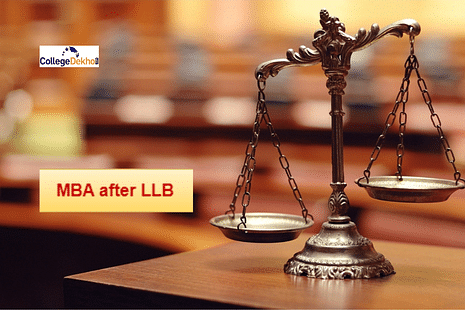
MBA After LLB:
Law graduates have long been confused about whether to go into private practice and go up the legal ladder from lower to higher courts, or if they should pursue an MBA to develop their business acumen. The rise in law graduates enrolling in MBA programs at reputed business universities is probably due to this. With the aid of an MBA after LLB, professionals can gain competence in either field, such as marketing in management or litigation in law.
Further education especially an MBA degree after having completed LLB is one'e cue to not only grow their career profiles but also climb up to managerial roles. It could assist one’s progress professionally in an industry that is constantly expanding internationally.
Given the demand for people with both legal and MBA degrees, it may also be assumed that it would offer more salary packages to MBA graduates than to candidates merely possessing a law degree. Let us now have an in-depth understanding about pursuing an MBA after LLB.
Why Pursue MBA after LLB?
After an LLB, an MBA will increase competence in both areas. As a result, one's professional career would take on new dimensions. One may expect to earn more money than one would have with a law degree. The following justifies pursuing an MBA after an LLB:
An MBA degree will enable you to manage others in addition to yourself, but a legal degree will only need you to work individually.
Your networking opportunities will expand.
MBA is the basic foundation for entrepreneurship.
The opportunity to make business decisions will arise after receiving an MBA.
With an MBA, a lawyer's role in a legal firm will initially be more varied and comprehensive than that of other practitioners.
You can definitely progress to managerial positions in a profession like investment banking or business development. You can choose to work as a consultant rather than accepting a traditional legal or administrative position.
- You might land in the position of an in-house legal counsel for a large corporation, or you might expand globally.
MBA after LLB vs LLM after LLB
In order to do business, an MBA following an LLB helps in learning about the markets, trends, and regulations employed in international companies. Professionals capable of working with clients from all around the world are the target audience for an MBA. This course is designed for students who are able to work with multinational organizations, conduct business anywhere in the world, and resolve issues on a global scale.
Candidates should first review the differences between the two courses listed below in order to comprehend why studying an MBA becomes essential after earning an LLB degree:
Particulars | LLM Details | MBA Details |
|---|---|---|
Full Form | Masters of Law | Master of Business Administration |
Stream Type | Law | Management |
Eligibility | LLB | Bachelor's degree with a minimum of 50% aggregate or an equivalent CGPA [45% in case of the candidates belonging to Scheduled Caste (SC), Scheduled Tribe (ST) and Persons with Disability (PWD) categories] |
Admission Process | Entrance exam (CLAT, SET, LSAT) + counselling | Entrance exams (CAT, CMAT, MAT) + group discussion + personal interview |
Average Annual Fee Structure | INR 2,00,000 - 5,00,000 | INR 4,00,000 - 5,00,000 |
Average Annual Salary Package | INR 4,00,000 | INR 7,00,000 |
Specializations |
|
|
Job Profiles |
|
|
MBA After LLB Eligibility Criteria
Candidates who wish to pursue an MBA after completing an LLB must fulfill the following requirements:
Candidates must have passed Class XII or its equivalent from a recognized board with a minimum aggregate of 50%.
Candidates may also have pursued an integrated law course like BA LLB, BBA LLB, BCom LLB, BSc LLB, BTech LLB, etc.
Applicants should qualify for one of the national-level MBA entrance exams, such as the CAT, GMAT, XAT, MAT, ATMA, etc.
For seeking admission to specific institutions, candidates must qualify for university-level entrance exams like B-MAT, NIPER JEE MBA, CUSAT CAT, etc.
A minimum of 2.5 to 3 years of professional experience is required.
To be considered for final admission to any reputable university, it is mandatory for the candidates to successfully qualify for the personal interview or group discussion rounds.
National-Level Entrance Exams for MBA after LLB
To pursue an MBA after LLB, national-level common entrance tests like those mentioned below are considered:
Top MBA Specializations after LLB
Those who wish to pursue an MBA after receiving an LLB degree may consider the following list of the most popular specializations:
MBA Specialization | Course Description | Syllabus |
|---|---|---|
MBA in Retail and Supply Chain Management | The process of managing a retail organization's complete supply chain is known as retail supply chain management. Due to the low cycle time and constant movement of the products, the retail supply chain must be continuously monitored and kept defect-free. |
|
MBA in Investment Banking | The objective of this course is to produce qualified individuals for managerial and related positions in the investment and finance sector. It provides knowledge on investment, management, budgeting, investment outcomes, and financial asset monitoring. |
|
MBA in Finance | It deals with the various facets of finance such as management, control, and assessment of collection, investment, and resources. |
|
MBA in Healthcare | It teaches students how to manage a variety of departments in healthcare organizations like hospitals and pharmaceutical firms. |
|
MBA in International Business | It primarily deals with Foreign Policies, Trade, Foreign Investments, Export Management, Forex Risk Management |
|
Top Colleges Offering MBA after LLB in India
Since MBA is a globally acclaimed degree, some of India's best universities provide a world-class curriculum and facilities. The most eminent colleges in India for LLB graduates who want to earn an MBA degree are listed below:
MBA Specialization | Average Annual Fees (in INR) | Top Colleges |
|---|---|---|
MBA in International Business | Rs. 10,00,000 | |
MBA in Real Estate and Urban Infrastructure | Rs. 5,50,000 - Rs. 7,50,000 | |
MBA in Retail and Supply Chain Management | Rs. 1,00,000 - Rs. 10,00,000 |
|
Scope of MBA after LLB
Some of the job profiles associated with specific MBA specializations have been provided below:
MBA Specialization | Job Profiles |
|---|---|
MBA in Finance |
|
MBA in Investment Banking |
|
MBA in Real Estate and Urban Infrastructure |
|
MBA After LLB Salary
Candidates must be well-aware of the returns on investment before enrolling in any degree program. The following is a list of job profiles and associated pay scales available after obtaining an MBA after an LLB:
Job Profile | Salary Package (in INR) |
|---|---|
9,61,000 | |
| Finance Manager | 11,00,000 |
Risk Management Director | 43,86,000 |
| Market Research Analyst | 8,00,000 |
Corporate Auditing Director | 49,69,000 |
Flight Planner | 9,40,000 |
Marketing and Sales Director | 26,86,280 |
| Operations Manager | 8,00,000 |
| Supply Chain Program Manager | 4,50,000 - 12,00,000 |
| Business Development Executive | 15,00,000 |
Salary After LLB
The average salary for LLB graduates are:
Job Profile | Annual Salary Package (in INR) |
|---|---|
Corporate Lawyer | 5,00,000 - 7,00,000 |
Legal Analyst | 4,00,000 - 5,00,000 |
Court Magistrate | 14,00,000 |
Corporate Lawyer | 10,00,000 |
Taxation Lawyer | 9,00,000 |
Legal Acquisitions | 8,00,000 |
The MBA bridges the knowledge gap between business and law by integrating the two distinct domains. More mergers and acquisitions happen on a daily basis, and a law graduate alone would not be qualified to handle such cases. If you want to work in investment banking, it will be excellent if you have both a law degree and an MBA from a recognized business school. You will be equipped with the knowledge and abilities to make business decisions. MBA-holding law graduates are capable of handling business-related aspects. A law graduate who takes an MBA would not only be better able to manage things but also learn more about some intricate business processes.
Also Read:
Are you feeling lost and unsure about what career path to take after completing 12th standard?
Say goodbye to confusion and hello to a bright future!

FAQs
Graduates with an MBA after LLB degree have more career and educational opportunities in both the public and private sectors. Numerous job offers are made to graduates in a variety of fields and legal firms both domestically and internationally. The majority of positions are well-paid, and experience level affects pay scale. The following are the areas of employment for an MBA after LLB:
Taxation Affairs
Retail Law
Legal Consultation
International Trade Law
Corporate Law
Business Law, etc.
Yes, pursuing an MBA after LLB is a good option. It provides student profiles more consideration and broadens their application options in the relevant job market environment. Graduates who pursue an MBA after LLB and practise business-related law are better able to comprehend the subtleties of business management to organise their arguments and supporting materials to support their legal viewpoints.
Several MBA after LLB job opportunities are available for graduates in India. By obtaining an MBA degree after pursuing an LLB, students can work in client-based firms related to their fields as managers. The following are the career prospects for MBA after LLB:
Business Lawyer
Corporate Lawyer
Firm Manager
Human Resource Manager
International Lawyer
Legal consultant
Marketing specialist, etc.
The following are the major benefits of pursuing an MBA after LLB:
MBAs include a strong emphasis on marketing and economic development, which aids LLB students in establishing themselves and improving their offerings.
Additionally, it provides room for entrepreneurs to start their own law companies and services.
Law graduates who combine their LLB and MBA degrees can receive higher pay grades. As corporate lawyers with very high pay grades, they can make additional money by serving as legal advisors to businesses, the government, and other industries.
If one wants to work in law, one must study an LLM, and if one wants to work in administration or management, one must pursue an MBA after LLB. An LLM should be prioritised in some cases, while those who are interested in management may obtain an MBA. Hence, it depends on one’s career perspective to choose whether LLM or MBA after LLB is better.
Numerous universities and colleges, including TAPMI Manipal, VIPS and Delhi School of Business, NALSAR Hyderabad, and Alliance University, provide MBA after LLB degree programmes. Law graduates can apply for admission to the MBA programmes at all 13 IIMs as well as other prestigious business schools in India including MDI, SPJIMR, IMT, BIMTECH, IMI, Great Lakes, LIBA, XLRI, IFMR, and XIM.
Communication and understanding skills should be excellent among MBA LLB graduates. Besides the fundamental qualification requirements, candidates must possess the following skills that are required for MBA LLB course graduates:
Attention to detail
Communication skills
Decision-making skills
Intellect
Managerial skills
Objectivity
Problem-solving skills
Research skills, etc.
There are several MBA after LLB specialisations available in India. With so many options to choose from, students usually struggle to decide which of the various MBA specialisations will incorporate their investigation skills to the best use. The following specialisations are best in MBA after LLB:
LLB with MBA in Entrepreneurship
LLB with MBA in HR Management
LLB with MBA in Finance
LLB with MBA in Accounting
The top recruiters for MBA after LLB are Amarchand and Mangaldas and Suresh A Shroff Co., Barclays, Boston Consulting Group, Deloitte, Desai and Diwanji, Deutsche Ban, E & Y, Goldman Sachs, KPMG, Luthra and Luthra Law Offices, McKinsey, Morgan Stanley, S & R Associates, etc.
Was this article helpful?


















Similar Articles
MAH MBA CET Score vs Percentile 2025 (Updated): Check Slot-wise Analysis, Cutoff
Last 5 Years AP ICET Question Papers: Download PDFs Here
50 AP ICET 2025 Communication Ability Questions and Answers
Documents Required for AP ICET 2025 Application Form: Photograph, Signature, Payment Details
How to Score 170+ in AP ICET 2025?
IIM Result 2025 (Out): Direct Link (Available), Release Dates, Status, Final Cutoff & Selection List